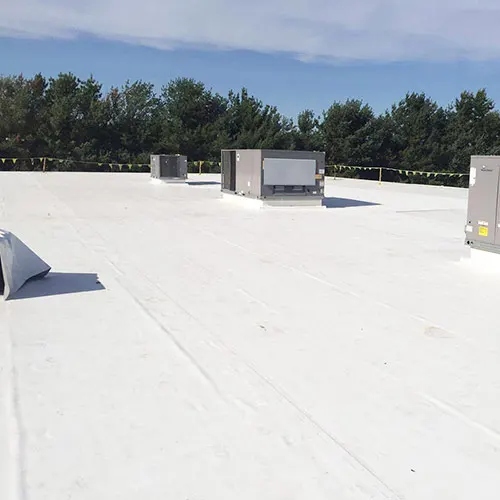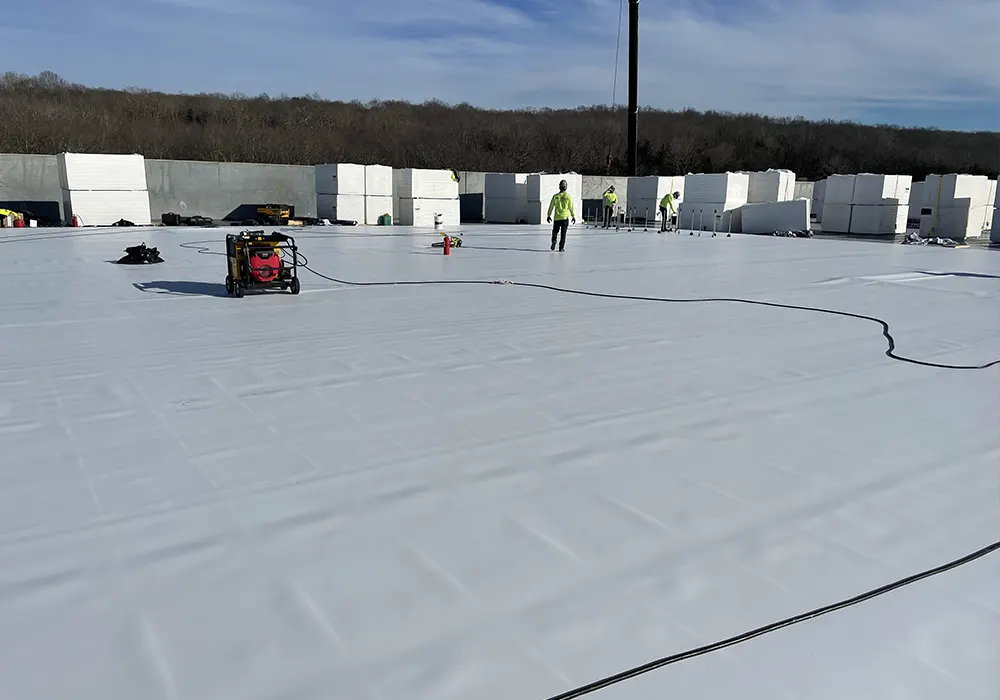TPO
What is TPO Roofing?

TPO (thermoplastic polyolefin) roofing is a single-ply synthetic roofing membrane that has been gaining popularity in the commercial roofing sector in recent years due to its many notable benefits. TPO is also a variation of “rubber roofing,” which is commonly used on flat commercial roofs for its strength and durability.
TPO roofing membranes offer a durable, energy-efficient and cost-effective roofing solution. Its seamless system construction means that a TPO roof has the strength needed to withstand all kinds of weather extremes, from ice to water to wind and hail, and its lifespan can exceed 20 years.
Polyisocyanurate (polyiso)
This stiff, dense material has a high R-value, which is a large factor in reducing energy bills.
Expanded polystyrene (EPS)
Known for its high R-value, this material is rigid, tough and water-resistant.
Extruded polystyrene (XPS)
XPS is tougher than EPS and has a high resistance to UV rays as well as water.
Performance & Sustainability
TPO membranes are increasingly popular in the commercial roofing industry largely due to the naturally-reflective white surface, which blocks UV rays, meaning that the building’s temperature can remain consistent and the heating/cooling systems can work more efficiently, which translates to lower energy bills. Since the material is flexible, it resists tears and damage from impacts, and the flexibility allows the membrane to accommodate the building’s settling, as well as temperature fluctuations, without forming splits or cracks.
TPO membranes are Class A fire-resistant, thanks to the fire retardant added to the material during the manufacturing process, and the material is also resistant to corrosion, disintegration mildew and algae. The ease at which a TPO roof is maintained makes it an attractive option for large commercial buildings, and the relative cost savings reinforce its attractiveness.
A TPO roof can be expected to last up to 20 years with proper installation and care. While the material is durable and puncture-resistant, there is some opportunity for the seams to come apart, increasing the potential for leaks. Having semiannual inspections of the roof is typically enough to discover potential problems early and perform repairs before they become serious.
The cost of the installation can vary depending on several factors, including:
- Size of the roof
- Ease of access to the roof
- Type of insulation
- Materials used
- Installation method
- Condition of the existing roof
- Number of roof penetrations/protrusions
configurationTPO Roof Assembly

Underlayment
Roof deck
TPO membrane
Elastomeric (adhesive) layer
Cover board
Insulation
The insulation layer is, as discussed above, typically made from polyiso, EPS or XPS. The insulation can be attached to the substrate either mechanically, full adhesion or a combination of both.
Vapor barrier
Flexible - strong - waterproofWhy Choose the TPO System?
TPO has many advantages as a roofing system. The material is reflective and UV-resistant, which keeps the building cooler in the summer and warmer in the winter. This saves on energy and thus helps to reduce energy bills, as well as contributes to reducing a heat island effect. Furthermore, TPO is resistant to ozone exposure and will not degrade.
TPO is flexible, durable and resistant to damages of all types: tearing, punctures, impact damage and thermal shock and is highly resistant to algae, mold and mildew growth. It’s also a cost-effective and environmentally friendly solution, as the material is manufactured using no dangerous chlorine and is 100% recyclable at the end of its useful life.
The fact that TPO is hot-air welded at the seams means that it is 3-4 times stronger than a roofing system that relies on adhesive alone. The roofing is designed to resist buildup of dirt and debris, but a low-maintenance plan consisting of a seasonal cleaning and a semi-annual inspection is recommended for optimal performance and longevity.
Waterproof and wind-rated up to and above 120 mph, this material is a proven technology that is not easily damaged, is low-maintenance and typically comes with generous warranty coverage from the manufacturer.

